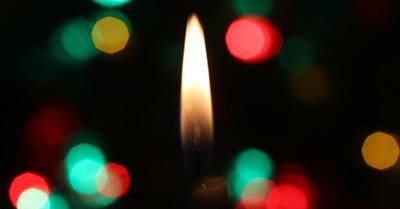What it Means to Pray for Peace in Times of Darkness
“Mom and Dad, they sacrificed their lives to save me,” sixteen-year-old Rotem Matias told CNN yesterday. When the Israeli-American teenager and his parents were attacked by Hamas terrorists last Saturday, his mother died trying to shield him. He was shot but survived and will keep the bullet removed surgically from his stomach “as a memory to never forget” his parents and the other victims.
Every Jew in Israel and around the world old enough to remember Hamas’s invasion will never forget it. After more than thirty trips to the Holy Land, I can tell you that this tiny country is interconnected in ways Americans cannot understand. Nearly everyone knows someone who was directly affected by the atrocities of October 7.
Now we are learning that Jews around the world could be victims of Hamas. The terror organization’s head is calling for a Global Day of Rage today in which Muslims across the globe would “fight against the Jews.” The former leader of Hamas is similarly urging Muslims around the world to protest today and is calling on Muslim nations in the Middle East to join the battle against Israel.
Hamas is also vowing to broadcast executions of its hostages on the internet if Israel strikes Gaza. The terrorists have already flooded social media with violent videos and graphic images of the kidnappings and murders it staged last weekend. We are now learning that a nine-month-old baby is among the hostages taken by Hamas.
What should Israel do next?
How should Israel respond to such horrific terrorism? Broadly speaking, they have four basic options.
One is to effect a prisoner swap, exchanging Palestinian prisoners for hostages held by Hamas in Gaza. This was done in 2011 when Israel exchanged a thousand such prisoners for a soldier named Gilad Shalit who had been held in Gaza for five years.
A second is to continue the aerial bombing campaign they began earlier this week, seeking to kill Hamas’s leaders and degrade the group’s ability to launch weapons against Israel. This has been Israel’s response numerous times in the past.
A third is to tighten the blockade that already exists around Gaza. For example, Israel’s energy minister announced earlier this week that no electricity or water would be supplied to the area until those abducted are returned home.
A fourth is to stage a ground offensive in which Israeli troops enter Gaza to find and destroy Hamas’s leaders, fighters, and weapons.
Is a ground offensive coming?
The first three approaches have not deterred Hamas in the past from the continued aggression against Israel, to which its charter pledges the terrorist organization. Any or all of them would be perceived as a major victory for Hamas and could be used to help the group gain power in the West Bank. If this occurred, the threat posed to Israel from Gaza (some forty miles from Jerusalem) would be magnified exponentially from the West Bank (which includes East Jerusalem).
Israeli military leaders have not announced their decision at this writing, but this morning they directed the evacuation of northern Gaza within twenty-four hours, which could signal an impending ground offensive. They have also amassed more than three hundred thousand reservists close to Gaza. A military spokesman said, “There’s not a family that does not have somebody that’s been called up.”
If Israel chooses this fourth option, its soldiers will face “brutal urban warfare” in the coming days. We should also note that Hamas is in the West Bank and Lebanon, as well as in Gaza. As a Gaza-based political analyst noted, it would be difficult for Israel to truly uproot Hamas. “The US stayed in Afghanistan for twenty years, did it end the Taliban?” he asked.
Urban warfare in an area as densely populated as the Gaza Strip would undoubtedly lead to many civilian casualties among the Palestinian population. Would this damage the prospects for peace between Israel and its Arab neighbors? Would it kindle a wider war, sparking uprisings in the West Bank and bringing Hezbollah into the conflict? Is this Iran’s larger strategy?
At the same time, how can Israel allow Hamas to continue to exist in anything like its present state and capacity? If they do, will the October 7 atrocities only continue? Can there ever be peace with a terrorist group pledged to their destruction? Does Israel have an obligation to its people to destroy this enemy that threatens its very future?
“The line separating good and evil”
My purpose today is twofold.
First, to help us understand the truly difficult choices Israel is being forced to face and thus to encourage us to pray fervently for her leaders and people in this unprecedented time in their nation’s history.
Second, to illustrate the biblical fact that “sin when it is fully grown brings forth death” (James 1:15). Death to the sinner and, all too often, to their innocent victims as well.
Aleksandr Solzhenitsyn observed in The Gulag Archipelago, “The line separating good and evil passes not through states, nor between classes, nor between political parties either—but right through every human heart—and through all human hearts.”
This is why the gospel is so urgently needed. Only Jesus can change terrorists like Saul of Tarsus into missionaries like Paul the Apostle. Only he can forgive the deepest depravities of the human heart. Only he can bring lasting peace to the human condition.
We are told to “pray for the peace of Jerusalem” (Psalm 122:6). However, true peace is a “fruit” of the Spirit (Galatians 5:22) and thus can come only from the Prince of Peace (Isaiah 9:7; cf. John 14:27; 16:33).
The old aphorism is still true: “Know God, know peace. No God, no peace.”
Will you join me in praying for the truest and deepest “peace of Jerusalem” today?
Photo Courtesy: ©Getty Images/Joe Raedle / Staff
Publish Date: October 13, 2023
Jim Denison, PhD, is a cultural theologian and the founder and CEO of Denison Ministries. Denison Ministries includes DenisonForum.org, First15.org, ChristianParenting.org, and FoundationsWithJanet.org. Jim speaks biblically into significant cultural issues at Denison Forum. He is the chief author of The Daily Article and has written more than 30 books, including The Coming Tsunami, the Biblical Insight to Tough Questions series, and The Fifth Great Awakening.
The views expressed in this commentary do not necessarily reflect those of CrosswalkHeadlines.
For more from the Denison Forum, please visit www.denisonforum.org.
The Daily Article Podcast is Here!

.jpg)


















